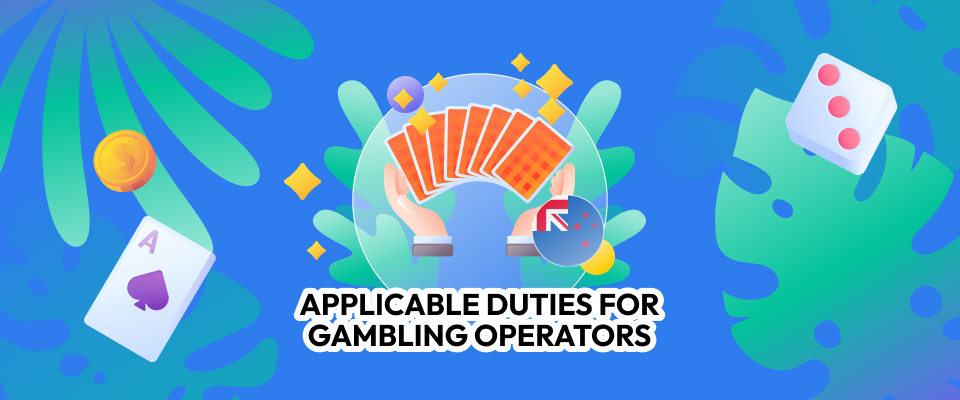Are There Any Taxes on Gambling Winnings in New Zealand?
Gambling is a popular pastime for Kiwis, and, for some, it might even be a profession. Like any money you generate, you should know whether it’s taxable or not to keep your finances neat. On this page, we’ll cover the tax implications of gambling winnings in New Zealand. Whether you’re a player or operator, a citizen or a traveller, inside New Zealand or abroad, you’ll find helpful information.
Do I Have to Pay Tax on Gambling Winnings? Quick Facts
No, you don’t have to pay taxes on your casual gambling winnings, whether you play pokies, live casino games, lotto, or bet on sports. Professional gambling, however, works a little differently than recreational gambling.
| Heading | Value |
|---|---|
Quick Facts | Your recreational winnings are considered “windfalls,” so they’re not taxable. |
Quick Facts | Casual players also don’t need to declare their winnings. |
Quick Facts | Income from your gambling winnings, however, is taxable. |
Quick Facts | If you gamble professionally and make it a source of income, your winnings are subject to taxes. |
Quick Facts | As a professional gambler, you must declare your winnings and losses to the authorities. |
Quick Facts | These rules stay the same if you’re not a resident of New Zealand. |
Quick Facts | Operators must pay duties and levies on lotteries, casinos, gaming machines, offshore gambling, and problem gambling. |
Quick Facts |
| Your recreational winnings are considered “windfalls,” so they’re not taxable. |
| Casual players also don’t need to declare their winnings. |
| Income from your gambling winnings, however, is taxable. |
| If you gamble professionally and make it a source of income, your winnings are subject to taxes. |
| As a professional gambler, you must declare your winnings and losses to the authorities. |
| These rules stay the same if you’re not a resident of New Zealand. |
| Operators must pay duties and levies on lotteries, casinos, gaming machines, offshore gambling, and problem gambling. |
We’ll discuss each of these topics in detail in the subsequent sections.
What You Need to Know About Tax Rules on Gambling Winnings

The Inland Revenue Department (IRD) is responsible for collecting taxes in New Zealand, which includes taxes on gambling. The IRD considers your overall situation to decide what type of gambler you are. This includes your purpose, regularity, skill, and profit intent. If it decides that your winnings are “windfalls,” not income, then you’re free of any taxation.
Then what’s considered professional gambling? Gambling professionally means you play frequently and in systematic ways with sophisticated strategies. This also indicates that you have the skill set necessary for professional gambling and rely on your winnings to live. In such cases, you need to register as a business in New Zealand and pay taxes on your gambling winnings to the IRD.
In either case, whether you gamble for entertainment or a living, you must pay taxes if you invest your winnings. That is, when those investments generate a taxable income.
What Are Taxes on Gambling Winnings in New Zealand?
Under previous legislation, Kiwis had to pay a 29% tax on all types of gambling winnings, whether from slots, casino tables, or sports bets. However, the rules changed in the last quarter of 2021, and casual winnings became non-taxable. In the subsections below, we’ll discuss other taxation queries related to gambling winnings.
Tax on Income from Winnings
As already mentioned, your winnings from recreational play are exempt from taxation, but there’s a catch. If you invest those winnings to generate an income, it falls under taxation. For instance, you could buy stocks or invest in other places that earn dividends, interest, or rental income. The IRD treats these assets as regular taxable income, so you’ll need to pay taxes.
Our tip would be to keep clear records of your gambling activities and winnings so that the IRD can evaluate your case correctly. For further help, speak to the IRD or an accountant to clarify if your winnings or earnings from them become taxable.
Do You Have to Declare Gambling Winnings?
If you’re a casual player with no intention to earn a living out of gambling, then no. The IRD doesn’t require you to declare your winnings from recreational play, whether you bet on pokies, lotto, live tables, or sports.
If you’re a professional gambler making a livelihood through gambling winnings, you must declare your winnings and losses. Your business registration should be done before you declare gambling winnings and pay taxes.
Tip: You’re Allowed to Deduct Your Losses From Your Winnings
If you’re recognised (and registered) as a gambling business, you can offset allowed expenses against your gambling winnings. This includes your losses on slots, table games, lotto, sports betting, or any other form of gambling. To qualify, you must:
- Be in a consistent, profit-seeking business
- Retain records of bets placed, platforms, total stakes, and outcomes.
- Use IRD forms to declare income and deductible losses.
Are Non-Residents Subject to Gambling Taxes?
If you’re a non-resident playing remotely or casually in New Zealand, you don’t have to pay tax on your gambling winnings. The same windfall principle applies here.
However, if you’re a non-resident earning an income as a professional gambler inside New Zealand, you are subject to income tax by the IRD. There are also withholding obligations for sports entertainers or performers, though normal gambling doesn’t fall under non-resident withholding tax rules.
Are New Zealand Residents in Other Countries Exempted From Gambling Tax?
Yes, as a New Zealand resident abroad, you maintain the same non-taxable status for casual gambling winnings. These are still non-taxable windfalls. Plus, gambling abroad is treated as a recreational activity globally.
If you’re a New Zealand tax resident via IRD’s 183-day rule or permanent abode, you must consider worldwide income, including income from gambling winnings. When you’re a professional gambler, your international gambling winnings are still taxable by the IRD. In this case, you might also be subject to taxes in the jurisdiction where you’re gambling.
What About Gambling Operators? Applicable Duties

While players, especially casual ones, can enjoy low or no obligations, operators carry multiple duties. The percentage of duties and levies varies depending on the services provided by the operator. Below is a breakdown of all the payable duties applicable to companies providing gambling services to players in New Zealand.
Lottery Duty
This duty applies to the New Zealand Lotteries Commission. The commission, providing lottery services to players, is bound to pay a 5.5% lottery duty on the nominal value of all tickets in a game. The New Zealand Lotteries Commission is also obligated to pay a problem gambling levy on all profits; more on that later. The payments and returns must be filed and carried out within 14 days after the date of the lottery draw.
Gaming Machine Duty
Gaming machine or pokies operators must pay the 20% gaming machine duty (GMD) on their net profits earned from gaming machines. To fall under this category, the operator can be:
- A corporate society that’s licensed to operate gaming machines under New Zealand’s Gambling Act 2003
- Or, a person who’s not licensed under the Gambling Act 2003 but operates a gaming machine.
According to IRD, a gaming machine is any device or machine that’s constructed, designed, or adapted for real money gambling and declared to be a gambling machine by regulations. The GMD return and payment must be filed and done by the 20th of each month after the operator becomes a registered gambling machine operator.
Devices that are only used to draw lotteries don’t fall under this category, and neither do random selection devices used for a housie. Devices that can only dispense tickets but cannot determine an outcome are also excluded from the category. Another exclusion includes communication devices that dispense tickets and draw lotteries that are part of a sales promotion scheme.
Casino Duty
Casino operators in New Zealand are subject to a 4% casino duty on the net gambling profits. At the end of each month, registered casino operators receive a “Duty available to file” message in the MyIR portal and can file the return and send the payment by the 20th of the following month. That is, the month after the period during which the duty applies. Operators paying a casino duty must also pay a problem gambling levy.
Offshore Gambling Duty
This duty came into effect on 1 July 2024. According to current legislation, offshore gambling operators must pay a 12% offshore gambling duty on net profits to the IRD. The operator falls under this category if they’re based overseas and offer gambling services or competitions for prizes to residents of New Zealand who pay to gamble or participate in those competitions to win prizes. Offshore websites owned by NZ casinos also fall under the same legislation.
At first, offshore operators must register for GST to supply remote gambling services to NZ customers. If they make at least NZ$60,000 of taxable supplies in 12 months, they’re obligated to register, file, and pay GST. Taxable supplies refer to the money the operator receives from residents of New Zealand, excluding the prize money paid to players. It also excludes profits that are liable for consumption charges the operator pays to the Department of Internal Affairs.
The due dates for filing returns and carrying out payments are:
- 28 October for the return period that ends on 30 September
- 28 January for the return period that ends on 31 December
- 7 May for the return period that ends on 31 March
- 28 July for the return period that ends on 30 June
Problem Gambling Levy
A problem gambling levy (PGL) applies to operators on all gambling profits. The IRD automatically calculates the payable amount when an operator files their return. Then, a GST invoice is issued to the operator, which includes the GST component of its PGL. The PGL rate is decided by Order in Council and reviewed every three years. The latest rates took effect on 1 July 2025. Let’s check out these current PGL rates.
| Heading | Value |
|---|---|
| Gambling Operators | Casino Operators |
| Income Liable | Casino wins |
| Rates (GST-Exclusive) | 0.89% |
| Gambling Operators | Non-casino gaming machine operators |
| Income Liable | Gaming machine profits |
| Rates (GST-Exclusive) | 1.24% |
| Gambling Operators | Racing Industry Transition Agency |
| Income Liable | Betting profits |
| Rates (GST-Exclusive) | 0.74% |
| Gambling Operators | New Zealand Lotteries Commission |
| Income Liable | Turnover less prizes paid and payable |
| Rates (GST-Exclusive) | 0.69% |
| Gambling Operators | Income Liable | Rates (GST-Exclusive) |
| Casino Operators | Casino wins | 0.89% |
| Non-casino gaming machine operators | Gaming machine profits | 1.24% |
| Racing Industry Transition Agency | Betting profits | 0.74% |
| New Zealand Lotteries Commission | Turnover less prizes paid and payable | 0.69% |
FAQs
Do you pay tax on gambling winnings in NZ?
Typically, no. As a casual gambler playing recreationally, your winnings are exempt from tax. However, if you’re making a profession out of it, you must register as a business and pay taxes.
How much do you get taxed if you win lotto in NZ?
Just like any other form of recreational gambling, lotto winnings are not taxable by the IRD. The law stays the same whether you win a small amount or a huge one in lotteries.
Are sports winnings taxable?
No, you don’t need to pay taxes on your winnings from sports betting activities if done casually and not professionally. There used to be taxes on such winnings, but it changed in 2021.
What if I win a large jackpot?
Even when you win a large jackpot, the rule stays the same. You don’t have to worry about taxation if you’re a casual player. For professionals, always keep a record of winnings for taxes.
Are cryptocurrency gambling winnings taxed?
For casual gambling with crypto, no. However, if you trade or invest in crypto via gambling sites or exchanges, you’ll be subject to taxation on your crypto capital gains or income.

